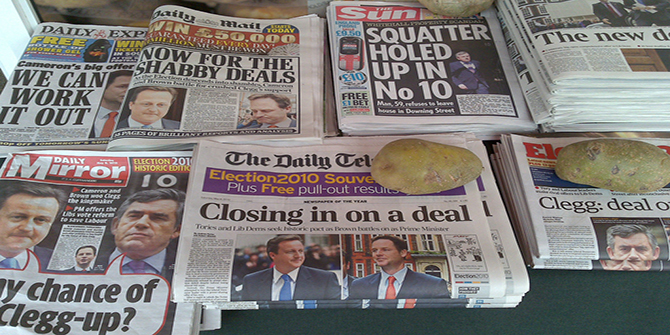 Recent crises such as the riots in England and the military campaign in Libya have led to an upswing in ‘tough talking’ by politicians. Nick Anstead explores how this style of rhetoric really operates and the agendas that often lie behind.
Recent crises such as the riots in England and the military campaign in Libya have led to an upswing in ‘tough talking’ by politicians. Nick Anstead explores how this style of rhetoric really operates and the agendas that often lie behind.
Politicians love to appear tough. Sometimes, this means saying things that we don’t want to hear, dealing in hard truths. Or so they claim at least.
There have been two prominent examples of such rhetoric in recent weeks. In the UK, Labour leader Ed Miliband was booed (although perhaps not as much as the media would have us believe) at the TUC conference. What bought about this reaction? This passage from Miliband’s speech drew particular ire:
I fully understand why millions of decent public sector workers feel angry. But while negotiations were going on, I do believe it was a mistake for strikes to happen. I continue to believe that. But what we need now is meaningful negotiation to prevent further confrontation over the autumn.
In trade union baiting of this kind, Miliband was following a well-trodden path. Tony Blair never seemed more comfortable than when lecturing the Labour Party, his brothers and sisters in the international social democratic family, or the union movement on the need to modernize or die.
Compare this with the second example of a tough talking politician. As noted in Slate Rick Perry clearly likes to shoot from the hip. In the Republican Presidential nomination debate in Tampa, Florida, when quizzed on some of his more acerbic comments, he replied:
There may be someone who is an established Republican who circulates in the cocktail circuit that would find some of my rhetoric to be inflammatory or what have you, but I’m really talking to the American citizen out there… I think American citizens are just tired of this political correctness and politicians who are tiptoeing around important issues. They want a decisive leader.
Both politicians claim to be straight talking, delivering unpalatable truths. Yet there is a world of difference in the political strategies they are pursuing. Miliband seems to be deliberately provoking his (actual) audience, in order to disseminate a message to the wider public – alienating his party base to reach out to floating voters. In contrast, Perry’s version of the truth seems to be pandering to rather than challenging the ideologues in his party.
There is an obvious explanation for this difference, of course. Perry is now competing in a party-based primary election. He has to win that vote in order to go before the national electorate, so it is hardly surprising his definition of truth telling is inline with party doctrine. Miliband has essentially gone beyond that stage, winning the Labour leadership in September 2010. Now he needs to talk to a national electorate.
But maybe there is also a more interesting story here, and other patterns could emerge with a bigger sample of tough talking politicians. It would be interesting, for example, to note whether left-wing politicians are more prone to attacking their own parties than those on the right (maybe because of some internalised version of Ronald Reagan’s Eleventh Commandment)? If this were the case, it would not be very surprising.
The past thirty years have seen neo-liberal ideologies created on the centre-right becoming political orthodoxy across much of the western world. Parties of the left have thus found it far more necessary to overtly reject their historic ideologies, which seemed the antithesis of the so-called centre ground. It is possible that this pattern, if it existed, represents a reversal of previous patterns of “truth telling” in the 50s, 60s and 70s, when collectivist ideologies were more dominant, and it would have been politicians on the right who were required to attack their political positions.
But one thing is certain – beware of politicians claiming to tell hard truths. They almost certainly have an agenda.
Please read our comments policy before posting








1 Comments